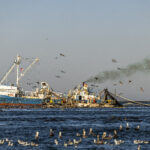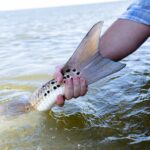
Gulf Menhaden Reduction Fishery: Bycatch Research & Useless Buffer Zones
Do you remember your driver’s test? How nervous were you when the instructor pulled out
By Tony Friedrich
Originally Published Here on Fissues
If you follow this blog, you probably know by now that the writers stand united against H.R. 200, the Strengthening Fishing Communities and Increasing Flexibility in Fisheries Management Act. We’ve written extensively about this deeply flawed legislation to make all of you aware of the bad aspects. These issues get pretty technical. My intention here is to speak to you fisherman to fisherman, so I’m going to address you directly in plain speak.
As a recreational fisherman, I want to have a decent chance at catching a few fish. The better that chance is, the more likely that I’m going to go fishing. As a side note, I’d love to see the relationship between abundant fish populations and divorce rates. From my own experience, there’s a direct correlation. But I digress. We all fish for the pure fun of it. So why get into the politics of your favorite past-time? Well, do you like your sport? Do you want your kids to be able to take their kids? If you answered “Yes”, please continue reading. If you have any questions, please comment below.
First and foremost, I am asking you to digest the information and make up your own mind. With that said, let’s talk about some facts. The supporters of this legislation have done a great job pushing some basic emotional buttons of that speak to fishermen, Catch phrases like “States Rights” and “Access” have been beaten like a rented mule. As a native Tennessean, I can tell you that “States Rights” has the same visceral reaction as a criticism against your mother. “Access” elicits the same response. Don’t take away my access! See, that got you worked up. Finally, “the economy will suffer if the law isn’t more flexible” narrative is getting plenty of airtime. If something is good, you don’t have to sell it on knee jerk emotional responses. Here’s a tip that you can take to the grave. When anyone employs the “tug on the heart strings” tactic for legislation, be very afraid. You are being hornswoggled.
Is the economy really suffering from not being able to kill more fish? Yamaha reported record sales in 2017. Here’s a quote from the article “Net sales increased thanks to the effects of yen depreciation and strong sales of motorcycles in the ASEAN region, outboard motors in the US.” Likewise, Shimano made Forbes list of the top 150 Multi National Performers. I bring this up because Shimano and Yamaha have been huge forces pushing H.R. 200. You have to ask the question, “What was the magic bullet that allowed the fishing economy to grow during a time of a stagnant US economy?” Well, in 2006 Magnuson Stevens was reauthorized and had put annual catch limits and rebuilding timelines in place. I looks like it worked. But don’t take my word for it. NOAA recently reported that 91% of our fish stocks aren’t over fished. So, claims of economic hardship are really efforts to get you fired up. Don’t fall for it.
States rights will always and forever be an issue in the country. There’s a certain distrust of the federal government and I get that. But, we aren’t talking about a $500 toilet seat at the Pentagon. We are talking about NOAA. These are smart folks who don’t have a dog in the fight. It isn’t science to the highest bidder. They are government employees who picked their profession the same reason you may have picked yours. They have a passion for it. NOAA scientists are the smartest people in the room if they tell you everything is fine and you can kill more fish. When they deliver bad news, they are foolish government folks who don’t know anything about what things are really like on the water. Is that really fair?
I mentioned science to the highest bidder. Do you want that to be the case? Because not all states can afford to manage fisheries. So, in swoops a multi-national corporation with a research grant and well, you get what you pay for. This is all too real with the case of menhaden in the Chesapeake Bay. When reductions were necessary, a world-renowned scientist was hired by industry to study menhaden. Well guess what? The scientists for hire said there were millions more than we thought, and the reductions were removed. Now, we’ve got far fewer of the most important forage fish in the ocean. I’m leery of too much government just like the next guy. But NOAA is a fisherman’s best friend. We should be discussing how to fund them better, not trying to give management to states that probably don’t have the resources or the expertise to do good science anyway.
You hear that recreational anglers need management flexibility to provide great access to the resource. Most of this argument is centered in the Gulf of Mexico reef fish. As someone who fishes the Atlantic, I can’t wrap my head around this. They are so blessed with countless species compared to us. Redfish, speckled trout, tuna, billfish, and countless other species are “accessed” daily. Their inshore “trash fish” (jacks) are better than anything we catch inshore. Some of the reef fish are overfished or recovering for a variety of reasons. So, there are seasons and bag limits designed to recover the stocks. This is the heart of the issue. Recreational anglers from that region feel their access is limited because of common sense measures. This could be handled at the council level. Instead, some private anglers chose a course that required changing the law. They are willing to muck up everything for the rest us to get what they want. That’s sad and unfair.
It all really comes down to a singular issue. Do you support creating loopholes that would increase the risk of overfishing? That’s the whole enchilada in plain speak. We can’t support H.R. 200 because we fight to preserve the resource for all … now and especially for the future. You have to think long-term. If you have two minutes, click this link and tell your elected officials that you don’t support H.R. 200. I hope we win. Even if divorce rates skyrocket, it will still be nice to catch a bunch of fish.

Do you remember your driver’s test? How nervous were you when the instructor pulled out

If you’ve spent any time on the water in South Florida, chances are you’ve heard

Photo Credit: Graham Tayloe Big Win for Redfish in Alabama Huge news from the Marine

Feature Photo: Carter Abramson | Simms Fishing at the Fisheries Science Symposium We have more
We rely on our members and donations to keep fighting for a sustainable tomorrow in marine conservation.
GIVE THE GIFT OF FISHERIES CONSERVATION THIS HOLIDAY SEASON. SHOP ASGA GOODS THAT FUND FISHERIES RESEARCH & ADVOCACY CAMPAIGNS
JOIN ASGA IN CALLING FOR CRITICAL MANAGEMENT ACTION AFTER YEARS OF SPAWN FAILURES & POOR MANAGEMENT.
By using this website, you agree to our use of cookies. We use cookies to provide you with a great experience and to help our website run effectively. To learn more, please review our privacy policy.